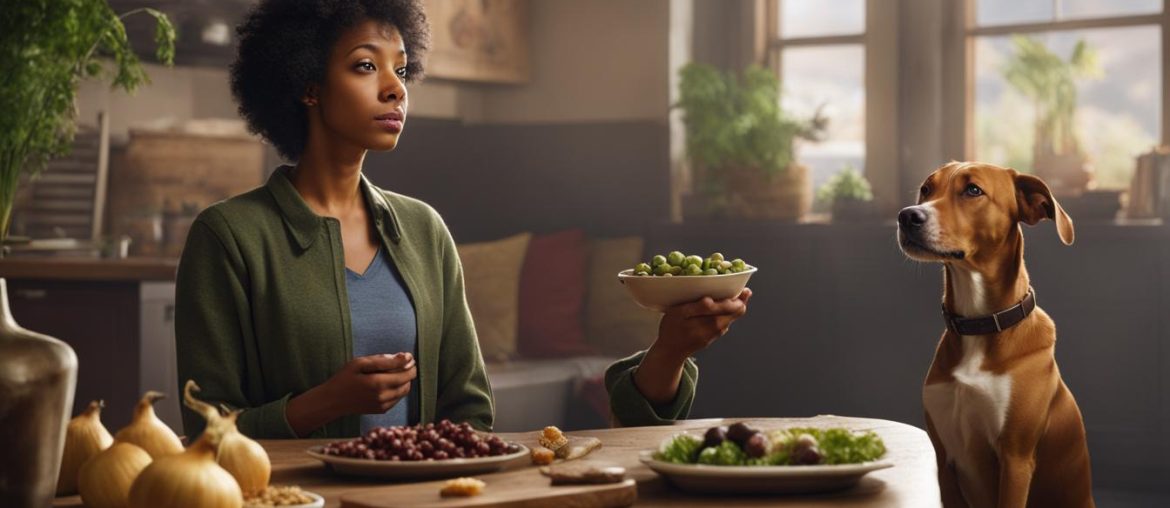Your furry friend is always curious and sometimes that curiosity can lead to accidental ingestion of dangerous substances, such as onions. As a responsible pet owner, it’s important to know what steps to take if your dog has eaten a small piece of onion.
Onions contain a toxic compound that can have detrimental effects on your dog’s health, even in small amounts. Immediate action is crucial to ensure your dog’s well-being. Here’s what you need to do:
Key Takeaways:
- If your dog has eaten onions, take immediate action to prevent further ingestion.
- Survey your surroundings to assess the situation and determine the amount of onion ingested.
- Prevent future access to onions by securing food and checking ingredient labels.
- Seek professional help from a veterinarian for proper treatment and guidance.
- Understand the symptoms and dangers of onion toxicity in dogs.
Survey Your Surroundings to Assess the Situation
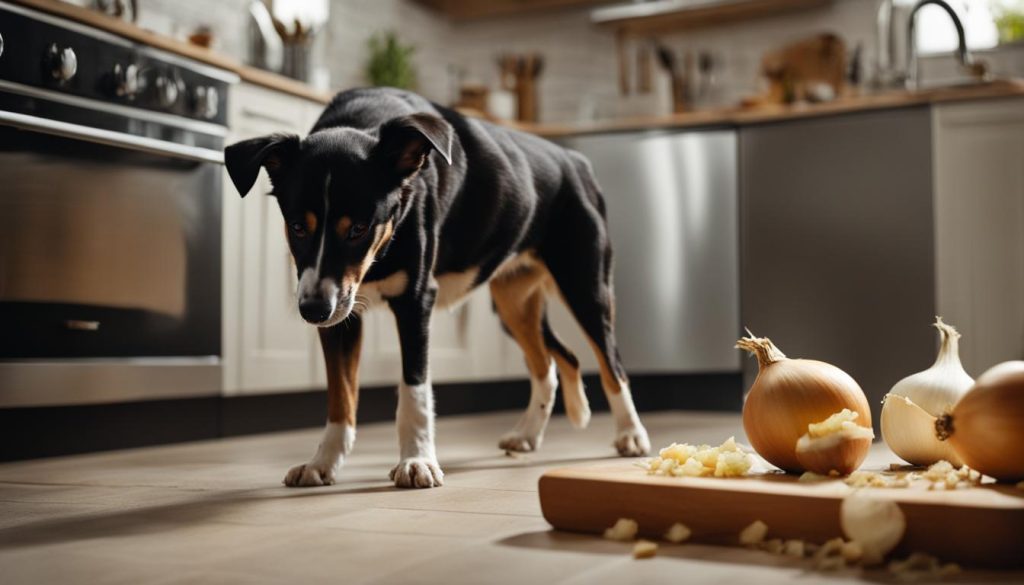
When you discover that your dog has eaten onions, it is crucial to survey your surroundings to gather important information about the situation. This knowledge will help you assess the severity of the ingestion and determine the appropriate course of action.
First, determine how much onion your dog consumed. Onions can be toxic to dogs even in small amounts, so it is important to understand the quantity ingested. If possible, check the area to see if there are any remnants of the onion or its packaging.
Next, consider when your dog ate the onion. The timeframe is vital because the longer it has been since ingestion, the more the toxic compounds in the onion can affect your dog’s health. Knowing the approximate time can assist your veterinarian in providing the best treatment.
Lastly, evaluate whether your dog ingested any other potentially harmful foods. If there were multiple food items accessible to your dog, it is essential to identify if any other toxic substances were consumed. This information will help your veterinarian determine the appropriate treatment plan.
Remember, the more accurate the assessment of the situation, the better equipped you will be to seek the necessary professional help and provide your dog with the appropriate care.
Prevent Future Access to Onions
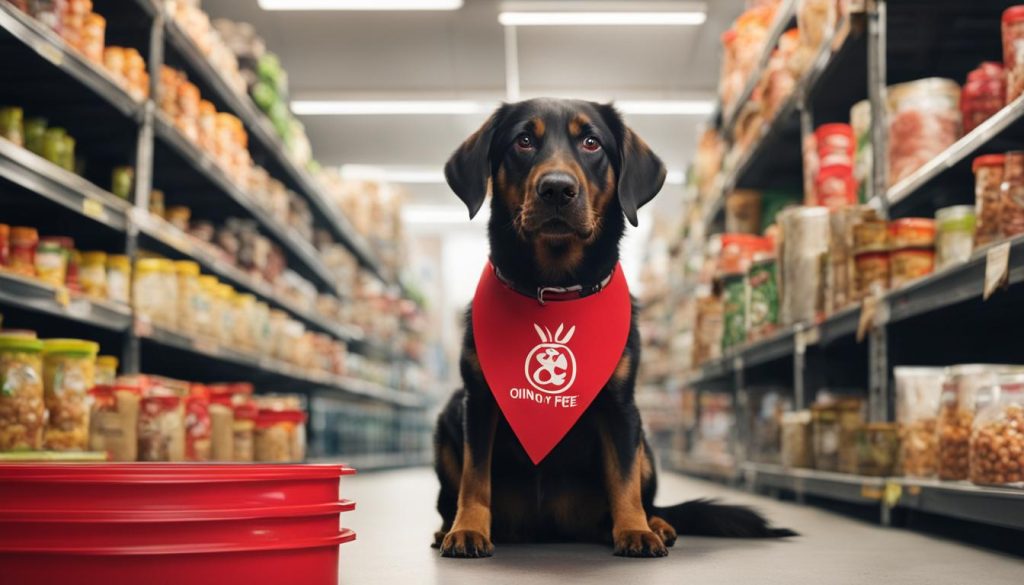
Now that you have assessed the situation and taken immediate action for your dog who ate onions, it is crucial to prevent future access to this dangerous food. By implementing a few preventive measures, you can protect your furry friend from potential onion ingestion:
- Secure Food: Store all food, including onions and onion-containing products, in secure containers or cabinets that are out of your dog’s reach. This will help prevent accidental ingestion.
- Check Ingredient Labels: When purchasing packaged or processed food, carefully read the ingredient labels to ensure they do not contain any form of onion. Remember that onions can have different names, such as dehydrated onion, onion powder, or onion extract.
- Be Mindful of Table Scraps: Avoid feeding your dog table scraps that may contain onions or onion seasoning. It’s best to stick to a balanced and nutritionally complete diet specifically formulated for dogs.
Table: Foods Dangerous for Dogs
| Foods | Remarks |
|---|---|
| Onions (all types) | Contains toxic compound that can lead to anemia in dogs. |
| Garlic | Similar harmful effects as onions, although in smaller amounts. |
| Grapes and raisins | Can cause kidney failure in dogs. |
| Chocolate | Contains theobromine, which is toxic to dogs. |
By taking these precautions, you can minimize the risk of your dog accessing onions and other dangerous foods. It is essential to remain vigilant and prioritize your dog’s safety when it comes to their diet and environment. Remember, prevention is key to keeping your beloved pet healthy and happy!
Seek Professional Help from a Veterinarian
If your dog is feeling ill after ingesting onions, it is essential to call a veterinarian for proper treatment. A vet can conduct tests and provide expert advice based on your dog’s specific circumstances. It is important to follow the veterinarian’s recommendations for treatment. Seeking professional help is crucial in ensuring the well-being of your furry friend.
When you contact the veterinarian, make sure to provide them with information about the amount and timing of the onion ingestion. This will help them assess the situation accurately and determine the best course of action. Remember, it is crucial not to try to treat the problem at home without professional guidance.
Upon receiving professional help, the veterinarian may recommend various treatments depending on the severity of the situation. They may administer activated charcoal, which helps absorb toxins, provide oxygen supplementation to support your dog’s respiratory system, or induce vomiting to remove any remaining onions from your dog’s stomach. It is important to trust their expertise and follow their instructions carefully for the well-being of your beloved pet.
Remember, quick action and seeking professional help are essential in mitigating the potential risks associated with onion ingestion. It is always better to err on the side of caution and consult a veterinarian to ensure the proper treatment and care for your dog.
| Treatment Options | Description |
|---|---|
| 1. Activated Charcoal | Administered to absorb toxins in the gastrointestinal tract. |
| 2. Oxygen Supplementation | Provided to support respiratory function if necessary. |
| 3. Vomiting Induction | Used to remove any remaining onions from the stomach. |
Understanding Onion Toxicity in Dogs
Onions are highly toxic to dogs and should never be consumed. They contain a sulfuric compound called N-propyl disulfide, which can cause significant harm to a dog’s health. All parts of the onion plant, including the flesh, leaves, juice, and processed powders, are dangerous for dogs to ingest.
Even a small amount of onion can have severe consequences for your furry friend. Onion toxicity in dogs can lead to anemia, a condition where a dog’s red blood cell count decreases. This can result in symptoms such as weakness, lethargy, and a decreased appetite.
Symptoms of Onion Poisoning in Dogs
It is important for dog owners to be aware of the symptoms of onion poisoning in dogs. These symptoms may include:
- Weakness and fatigue
- Loss of appetite
- Pale gums
- Vomiting and diarrhea
- Increased heart rate
If you observe any of these symptoms in your dog after onion consumption, it is crucial to seek immediate veterinary attention. The veterinarian will be able to assess your dog’s condition and provide appropriate treatment to ensure their well-being.
Can Dogs Eat Onion?
No, dogs should never eat onion. Even a small amount of onion can be toxic and potentially life-threatening for dogs. It is essential to keep all onion products out of reach and ensure that your dog does not have access to them. Prevention is key when it comes to protecting your furry companion from onion toxicity.
How Do Veterinarians Treat Onion Toxicity in Dogs?
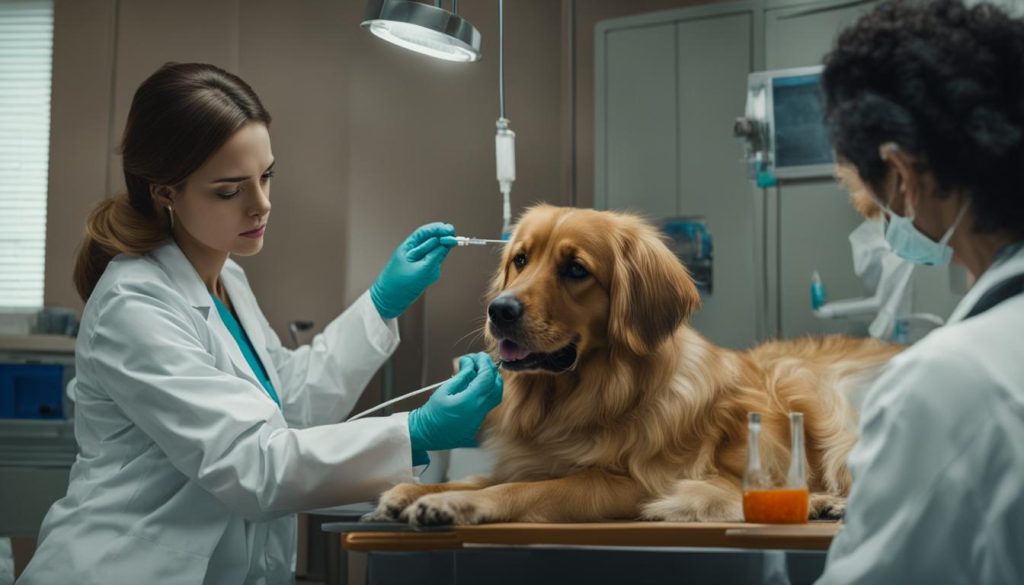
When it comes to treating onion toxicity in dogs, veterinarians employ various methods depending on the severity of the case and the amount of onion ingestion. It is crucial not to attempt home remedies and instead seek professional help for the best outcome.
Activated Charcoal
In cases where a large amount of onion has been ingested, veterinarians may administer activated charcoal. Activated charcoal works by absorbing toxins in the stomach, preventing them from being absorbed into the bloodstream. This can help reduce the harmful effects of onion toxicity.
Oxygen Supplementation
In severe cases, dogs may experience respiratory distress due to onion toxicity. Veterinarians may provide oxygen supplementation to improve breathing and oxygen levels in the blood. This can help alleviate symptoms and support the dog’s recovery.
Vomiting Induction
If the onion ingestion is recent and the dog has not already vomited, veterinarians may induce vomiting to remove the toxic compound from the stomach. This is typically done under controlled conditions to ensure the safety of the dog.
It is important to remember that each case of onion toxicity in dogs is unique, and the treatment approach may vary. Veterinarians will assess the specific situation and provide the most appropriate treatment options for the affected dog. Seeking professional help promptly is crucial to ensure the well-being and recovery of your beloved pet.
Understanding the Dangers of Onions for Dogs
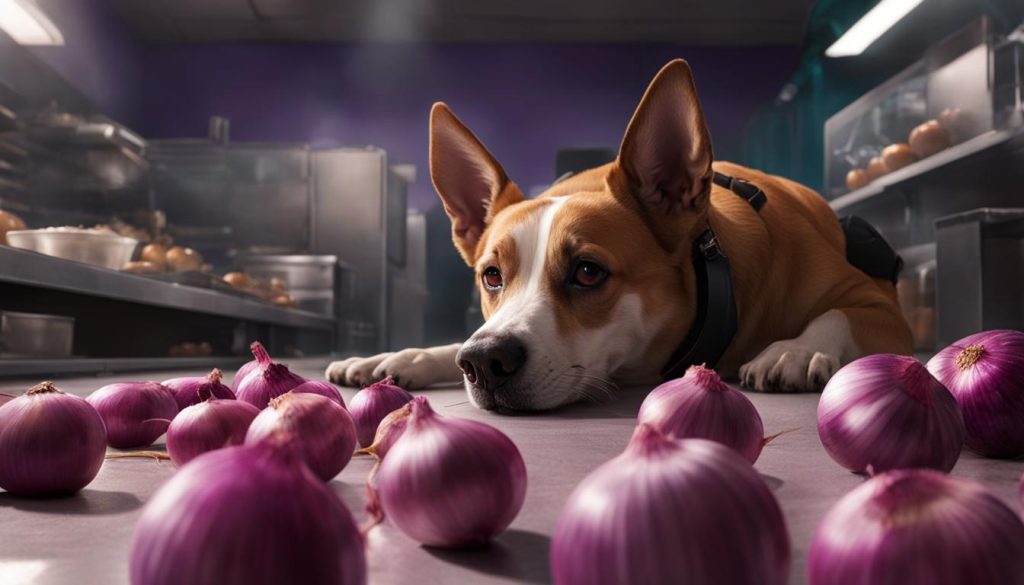
Onions pose a significant threat to the health of dogs due to their toxicity. It’s crucial for dog owners to be aware of the dangers posed by onions and take necessary precautions to protect their pets. Onions contain a toxic compound known as N-propyl disulfide, which can lead to anemia in dogs. This compound damages red blood cells, preventing them from carrying oxygen effectively throughout the body. As a result, onion ingestion can cause serious health complications for dogs.
All parts of the onion plant, including the flesh, leaves, juice, and processed powders, are toxic to dogs. Even a small amount of onion can have adverse effects on a dog’s health. Therefore, it’s important to ensure that onions are kept out of reach of dogs and that all food containing onions is securely stored.
Toxicity from onions can manifest in various symptoms. Dogs experiencing onion toxicity may exhibit a decreased appetite, muscle weakness, and lethargy. If you notice these symptoms in your dog, it’s crucial to seek veterinary attention immediately.
| Signs of Onion Toxicity in Dogs | Actions to Take |
|---|---|
| Decreased appetite | Seek veterinary attention immediately |
| Muscle weakness | Restrict access to onions and any other sources of them |
| Lethargy | Monitor your dog closely and consult a veterinarian for guidance |
If you suspect your dog has ingested onions, it’s important to act promptly. Restrict your dog’s access to any remaining onions and consult a veterinarian for further guidance. Remember, onion toxicity in dogs can be a life-threatening condition that requires professional intervention for the best chance of a successful recovery.
Symptoms of Onion Toxicity in Dogs
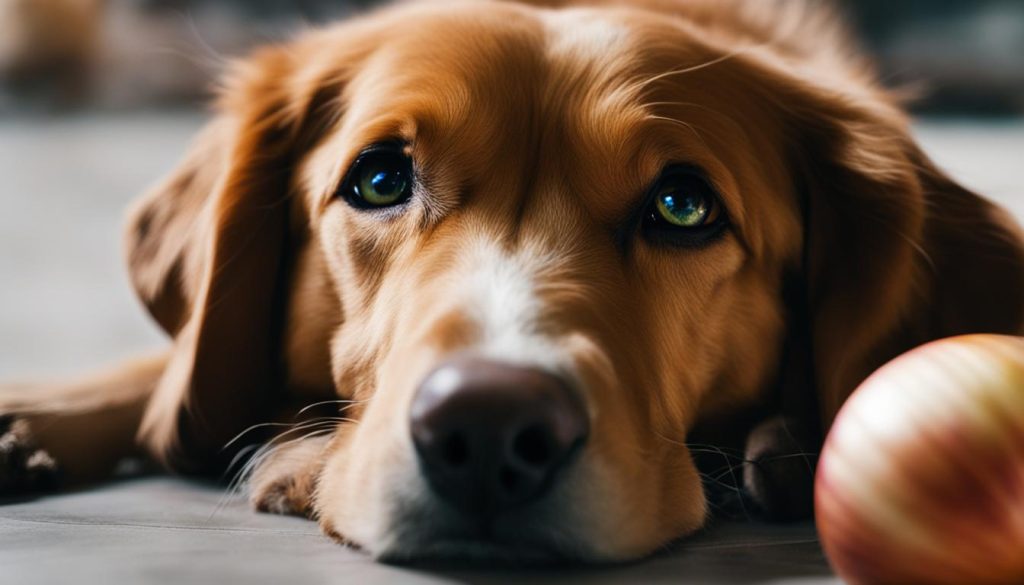
Onion toxicity in dogs can manifest through various symptoms. It’s essential to be aware of these signs so you can seek prompt veterinary attention if your dog has ingested onions. The symptoms of onion toxicity include:
- Anemia: Onions can cause damage to a dog’s red blood cells, leading to anemia. This can result in weakness, pale gums, and lethargy.
- Vomiting: Dogs may experience nausea and vomiting after consuming onions. It’s important to monitor their vomiting frequency and consistency.
- Elevated heart rate: Onion toxicity can affect a dog’s cardiovascular system, causing an increased heart rate.
- Panting: Dogs may exhibit excessive panting as a result of onion poisoning.
- Gastrointestinal effects: Onion ingestion can lead to gastrointestinal distress, such as diarrhea and abdominal pain.
If you notice any of these symptoms in your dog and suspect onion toxicity, it is crucial to contact a veterinarian immediately. Delaying treatment can worsen the condition and put your dog’s health at risk.
Remember, the symptoms of onion toxicity in dogs can vary in severity depending on the amount of onion consumed and the size of the dog. Even small amounts of onion can be harmful, so it is best to err on the side of caution and seek professional help if you have any concerns.
Taking Immediate Action if Your Dog Eats Onions
If you suspect that your dog has eaten onions, it is crucial to take immediate action to ensure their safety and well-being. Here are the steps you should follow:
- Prevent further ingestion: If your dog has access to more onions, remove them from their reach immediately. This includes checking the kitchen countertops, garbage cans, and any other areas where onions may be stored or discarded.
- Clean up any spills: If your dog has knocked over or spilled onions or any onion-containing products, make sure to clean them up thoroughly. Even small traces of onion can be harmful to your dog.
- Seek veterinary advice: Contact your veterinarian as soon as possible to seek professional guidance. Explain the situation and provide them with information about the amount and timing of the onion ingestion. They will be able to assess the severity of the situation and provide appropriate advice.
Remember, it is crucial not to try to treat the problem at home without professional guidance. Onion toxicity in dogs can be a serious condition that requires prompt veterinary care. By following these steps, you can take immediate action to ensure the safety of your furry friend.
Table: Symptoms of Onion Toxicity in Dogs
| Symptoms | Description |
|---|---|
| Anemia | Onion toxicity can cause a decrease in red blood cells, leading to anemia in dogs. This can result in weakness, pale gums, and lethargy. |
| Vomiting | Dogs may experience vomiting as their body tries to eliminate the toxic substances. |
| Elevated heart rate | The heart rate may increase as the body responds to the toxicity. |
| Panting | Panting excessively or difficulty breathing may occur. |
| Gastrointestinal effects | Digestive symptoms such as diarrhea or abdominal pain may be present. |
By recognizing these symptoms, you can better understand if your dog has been affected by onion toxicity. If you notice any of these signs, it is essential to seek immediate veterinary attention for proper diagnosis and treatment.
The Consequences of Onion Poisoning in Dogs
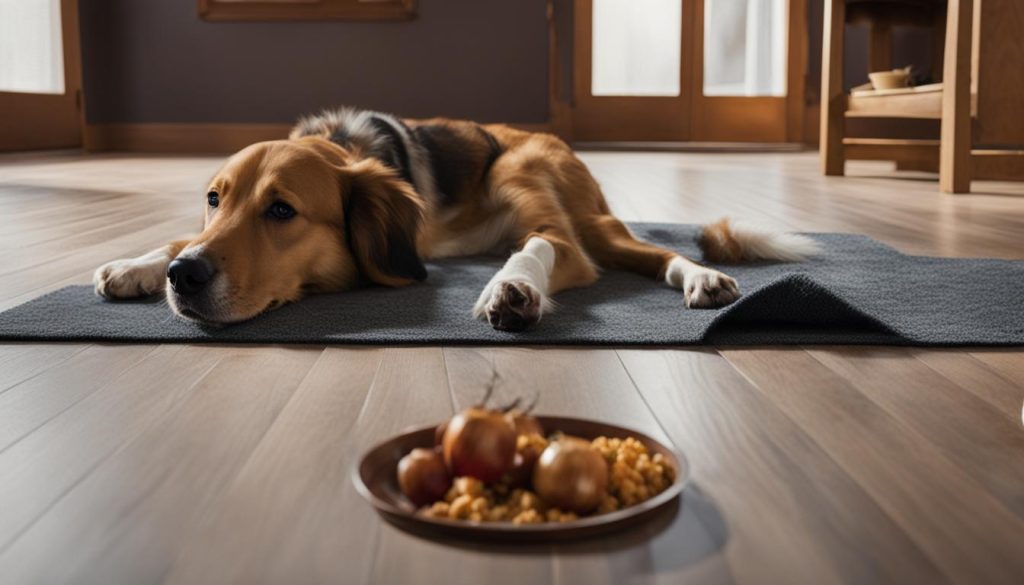
Onion poisoning in dogs can have serious consequences on their health. If left untreated, it can lead to anemia and cause damage to the liver and kidneys. The effects of onion toxicity can be life-threatening, but with prompt treatment, most dogs can recover. It is important to seek veterinary help quickly to ensure the best chances of a successful recovery.
Treatment for onion poisoning in dogs may vary depending on the severity of the case. In mild cases, inducing vomiting or providing supportive care may be sufficient. However, in more severe cases, a blood transfusion may be necessary to help restore the dog’s red blood cell count. It is crucial to follow the veterinarian’s recommendations for treatment and provide the necessary care to your furry friend.
Can onion poisoning in dogs be treated? Yes, it can be treated with the help of a veterinarian. However, it is important to note that prevention is always better than cure. Avoiding onion ingestion in the first place is the best way to protect your dog from the potential dangers of onion toxicity. Be mindful of what foods you give your dog and ensure they do not have access to any onions or onion-containing products.
Risk Factors for Onion Poisoning in Dogs
Some dogs may be more susceptible to the effects of onion poisoning than others. Certain breeds, such as Japanese breeds including Akitas and Shiba Inus, are more prone to develop hemolytic anemia from onion ingestion. Additionally, smaller dogs generally have a higher risk of experiencing adverse effects from onion consumption due to their size and metabolism.
It is essential to be aware of the potential dangers of onions for dogs and take the necessary precautions to keep them safe. By understanding the consequences of onion poisoning and working closely with a veterinarian, you can ensure your dog’s well-being and help them recover if onion ingestion occurs.
Safe Vegetable Alternatives for Dogs
While onions are off-limits for dogs, there are plenty of other vegetables that can be included in their diet to provide them with nutritional benefits. These vegetables not only serve as healthy treats but also add variety to their meals. Carrots, cucumbers, and green beans are excellent choices that are safe for dogs to consume.
Carrots are a great source of vitamins and minerals such as beta-carotene, which promotes healthy eyesight, and fiber, which aids in digestion. They also provide a satisfying crunch that dogs love. Cucumbers are hydrating and low in calories, making them a refreshing and healthy snack. They contain antioxidants and can help to promote good oral health by reducing bad breath. Green beans are packed with vitamins and fiber and can be served either fresh or lightly steamed. They make an excellent low-calorie option for dogs that are watching their weight.
It is important to note that not all vegetables are safe for dogs. Some vegetables, such as onions, garlic, and mushrooms, can be toxic to dogs and should always be avoided. Before introducing a new vegetable into your dog’s diet, it is best to consult with your veterinarian to ensure it is safe and appropriate for your furry friend.
Wrapping Up
To summarize, onions are highly toxic to dogs and should be avoided in their diet. If your dog has consumed onions, it is crucial to take immediate action to prevent further ingestion and seek professional veterinary help.
Remember to provide your veterinarian with important information about the amount and timing of the onion ingestion, as this will assist in determining the best course of treatment for your dog. Following the veterinarian’s recommended treatment plan is vital for your dog’s recovery.
Furthermore, it is essential to prevent future access to onions and other dangerous foods for dogs. By keeping food secure and checking ingredient labels, you can ensure your furry friend’s safety. Instead, opt for safe vegetable alternatives like carrots, cucumbers, and green beans that provide nutritional benefits for your dog.
Ultimately, by being proactive in preventing onion ingestion, seeking professional veterinary help promptly, and choosing safe vegetable alternatives, you can protect your dog’s health and well-being. Your furry friend relies on you for their care, so staying informed and taking the necessary steps is vital to keeping them safe and healthy.
FAQ
What should I do if my dog ate a small piece of onion?
If your dog ate a small piece of onion, it is still important to take immediate action. Contact your veterinarian for advice on the best course of action.
How can I assess the situation if my dog ate an onion?
To assess the situation, gather information about the quantity of onion consumed, the time of ingestion, and whether any other harmful foods were also ingested. This information will help determine the best steps to take.
How can I prevent my dog from accessing onions in the future?
To prevent future access to onions, it is crucial to keep food secure and check ingredient labels. Additionally, ensure that onions are stored safely out of your dog’s reach.
What should I do if my dog is feeling ill after eating onions?
If your dog is feeling ill after ingesting onions, it is essential to call a veterinarian for proper treatment. They will be able to provide expert advice and conduct necessary tests.
What are the symptoms of onion toxicity in dogs?
The symptoms of onion toxicity in dogs can include decreased appetite, muscle weakness, lethargy, vomiting, elevated heart rate, panting, and gastrointestinal effects.
How do veterinarians treat onion toxicity in dogs?
Treatment for onion toxicity in dogs may involve induced vomiting, administration of activated charcoal, oxygen supplementation, and in severe cases, blood transfusions. It is important to seek professional veterinary help for proper treatment.
Why are onions dangerous for dogs?
Onions contain a toxic compound called N-propyl disulfide, which can lead to anemia in dogs. All parts of the onion plant, including the flesh, leaves, juice, and processed powders, are toxic to dogs.
What are the consequences of onion poisoning in dogs?
Onion poisoning can lead to anemia and damage to the liver and kidneys. The effects can be life-threatening, but with prompt treatment, most dogs can recover.
What are some safe vegetable alternatives for dogs?
While onions are off-limits for dogs, there are many other safe and healthy vegetables you can offer as treats. Carrots, cucumbers, and green beans are excellent choices that provide nutritional benefits for your dog.
What should I do if my dog eats onions?
If you suspect your dog has eaten onions, prevent further ingestion, clean up any spills or accessible onion products, and seek veterinary advice immediately. Do not attempt to treat the problem at home without professional guidance.


